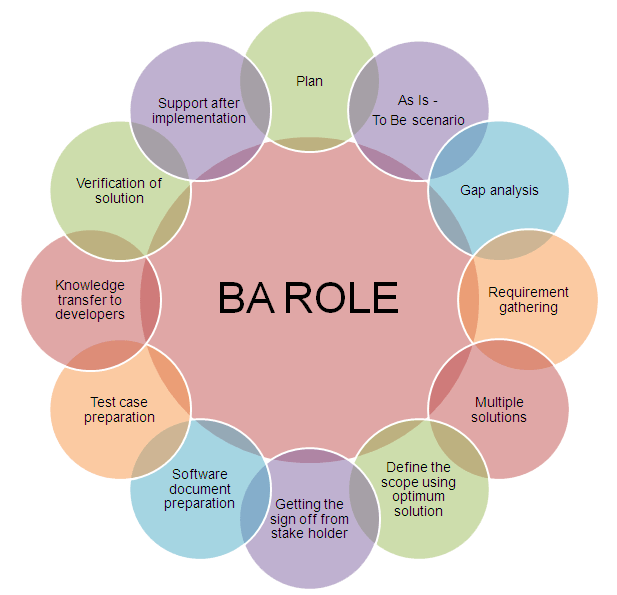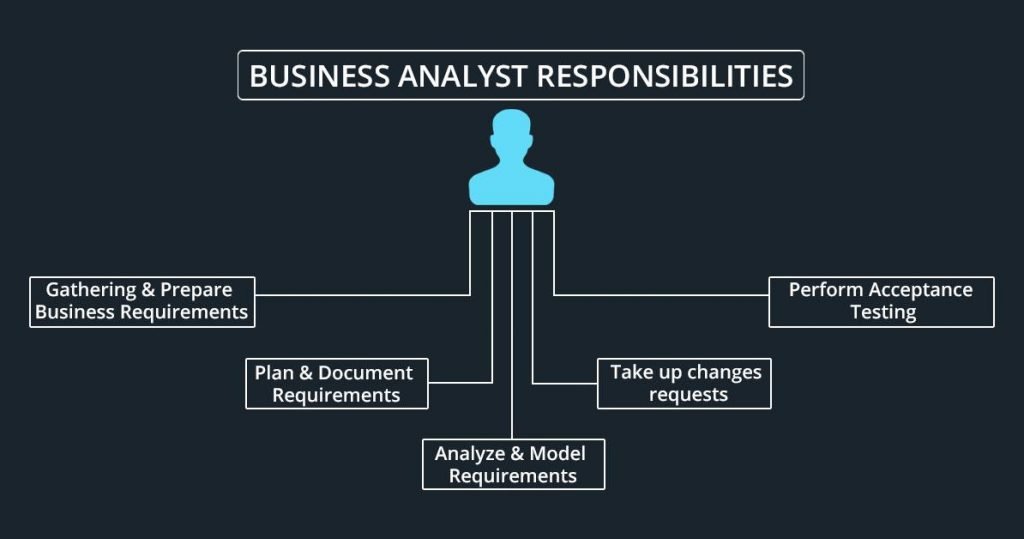
What is Business Analyst?
Business Analyst is a most popular profile and many organizations employ business analyst in order to generate more leads and earn a profit. This article will cover all of the necessary facts that are associated with BA profile along with a little introduction to what is business analyst role.
Today on the internet, you can find many facts that are associated with BA profile and may get confused about this. This article will provide you with precise information of the profile and you may even shape your career as per your skill as Business Analyst for the industry that best suits your skills.
Who is Business Analyst?
Business analysts have a key role in current business scenarios, and some people think that Business Analysts have only to generate money for the business organizations that may and may not be true depending on the requirement. Moreover, the actions of business analysts impact the financial status of any organization.
If we talk about the responsibilities of a business analyst, then they are expected to communicate with all business stakeholders and to analyse or validate the business process requirements related to any change in the business process, policies, and the information system. A skilled business analyst professional can enhance productivity, efficiency, and profitability of the organization.
Some basic business perspectives can be helpful for the success of any business organization. To be a successful business analyst, they are required to have the below-listed skills:
- Understanding of the complete business process and its structure
- Ability to improve the current business process
- Knowledge of the steps and tasks that are required to implement new features
- To identify and design and implement the new features
- To identify and assess the implementation of new features
Evolution of the role of a Business Analyst
- The profile of a business analyst has become indispensable to business environments as they are the key persons involved in the generation of leads and making profits. The role of business analysts has evolved over the years and has become one of the most in-demand jobs in the data science and analytics industry.
- Business analysts initially used to take charge of the complete systems and developed a deep understanding of the systems and processes. Apart from handling the business aspects, they would also handle many analytical and technical parts.
- However, the role gradually became more scattered with coming up of multiple domains along with their own set of requirements. Some organizations expect the analysts to have proficiencies in Python and R while others will not need it at all.
- Business analysts who were traditionally looked at being people who would bring about business agility and drive innovation, later evolved as being people with a lot of buzz around them. In non-IT firms, the role of a business analyst is generally limited to dealing with various organizational changes, product improvement, and extending the analytics capacity. The focus lies primarily on the organizational processes. Thus, they have an important role to play in bringing about business transformation by coordinating between the technology and the business teams.
- In addition to the specificities dictated by the domains, the role also undergoes a lot of change with the work experience. During starting stages, they may not have to deal with any kind of data, but as they gain more experience, the encounter with data becomes routine.
Why do Businesses employ Business Analysts?
Various businesses often hire business analysts for the following reasons:
- To gain a better understanding of the structure and dynamics of the organization where a new system has to be deployed.
- To gain a better understanding of the present issues faced by the target organization and also the identification of the potential pockets of improvement.
- To further ensure that the customers, end users, and even the developers have an enhanced understanding of the target organization.
During the business analyst training for beginners, very first a BA is taught to study and review the requirements of the process which are seen by various solution and design teams. He is expected to closely work with cross-functional teams like the solutions designers and project managers for reviewing the solutions documents. In large-sized organizations, a business analyst is seen coordinating between both the offshore delivery teams and on-site ones.
Primary Roles of a Business Analyst
Business analysts are most often assigned the role of liaising between the business management and technical developers. They are the ones who sit around with clients, understand and define their requirements for improvement of productivity.

At the same time, these people work with the technical process teams for ensuring the designing and implementation of the processes so defined.
- Facilitator: A business analyst plays the role of a facilitator by coordinating the analysis of requirements presented by the clients. He is further required to collaborate and communicate the same to all the stakeholders of the project for managing their expectations. This also ensures that the requirements are complete and clear. These are then mapped to the real-time business needs of the organization.
- Contributor: The next important role of a business analyst is to contribute to identifying the business problems, needs, functions, diving deep into the concerns of the stakeholders and identification of improvement opportunities.
- Analyst: As an analyst, he or she analyses organizational readiness for system implementation and supporting users. Also, the analyst is instrumental in
- Reviewing and providing inputs to the design of the IT system from a business perspective
- Helping to organize comprehensive and quality UAT while assisting users in developing test cases
- Coordinating with the management of various internal projects
- Reporting risks and other issues to the management
Responsibilities of a Business Analyst
A business analyst plays a key role in an organization and has many responsibilities to take care of. Here is a brief overview of the same

- Understanding Business Requirements: this forms a primary responsibility of a business analyst. He or she has to work in collaboration with all the stakeholders of the project, give time to understand their requirements, and translate the same into details. These have to be further converted into actionable details which are easy for the developers to understand. One has to have sharp communication skills for successfully handling this.
- System Possibilities: Business analysis for beginners also teaches an analyst to work with the software team, which is assigned for the project. He is tasked with transforming the initial high-level goal into something realistic. For this, he will need to work in sync with all the stakeholders.
- Presentation & Public Speaking: A business analyst will have to give many presentations time and again on many topics like ongoing project status, application designs, and even the cropping business requirements. Such presentations often become a source of game-changing ideas of the business.
- Elaboration of Project Details: This involves enumerating various details of the project by consulting a wide number of stakeholders. He or she has to define the functional specifications and other requirements which are already accepted by the stakeholders and developmental team.
- Implementation Support: Business analysts are generally not involved in implementation directly but have to be present in case of any support issue during the implementation phase. He or she may have to take up some problem-solving meeting, which will take up how certain business processes will be handled due to the newly recognized constraints.
- User Acceptance Testing: The business analyst has to ensure that the product which is designed is working as per the expectations of the user. It is thus a primary duty of the business analyst to design various testing scenarios and approaches.
- Documentation: Business analyst has to maintain proper documentation about various responsibilities handled like defining business requirements, implementation details, and other bottlenecks, etc. Each of these documents has to be highly coherent, informative, and usable for professional success.
- Team Building: Business analysts often build and lead formalized teams, which are well-structured, and all members have defined roles.
Important Business Analyst Skills
For any of the business, the Business Analyst must have certain skills that are considered must for the profile. The required skills for the professionals are analytic skill, leadership skill, business processes, and planning and technical knowledge. These skills can make professionals a successful analyst.

These skills are defined below:
- Analytical Skills: A business analyst can become successful if he possesses good analytical skills. To analyze the current business scenario and other competitive business processes a BA must have the skill and knowledge of analysis. They are required to analyze data, the user or stakeholder workflow, and inputs and other documents so must know the methods of analyzing data.
- Leadership Skills: Due to leadership skills a business analyst can forecast budget and help the team members and direct them as and when needed.
- Business Process and Planning: They must know the way to plan the project scope and understand and implement the project requirements, to identify the resources that are required for any project. A Business analyst must have the knowledge and skill to plan business process in an efficient manner
- Technical Skills: Here, technical skill means to have knowledge of all technicalities. Not only in the IT sector, instead of for any sector it is good if the BA will have the knowledge of his field, like if he is from the IT field, then he must know about the operating system, networking, SDLC, database concepts, hardware, and other technical concepts.
Business Analyst Tutorial For Beginners
If you want to be a successful business analyst and planning to start your career as a BA, then some requirements can help you in making your career successful. You can kick start your business analyst career by following these guidelines and concepts.

Below listed steps can help you to shape your career as a business analyst:
1)Confirm your Career Choice and Learn the basics of BA Profile
As you are going to enter a new field so you must have complete knowledge of this profession. There are plenty of resources that can help you in gaining knowledge of this profession. Accumulate enough knowledge of this profession and become a successful professional. Gaining knowledge about the profile is the first step towards shaping the career as BA professional. As too many professionals waste their time in identifying the necessary skills and the exact responsibilities of them. Determine that is BA profile right choice for you or not so that you can become a successful professional.
2)Identify your Leveraging Skills for the BA Profile
If you are joining BA profile in your mid-career, then you may already possess many of the required and necessary skills that are important for BA profile. You can make your skills transferable to the required BA profile skills as per your career background and qualifications. You can also opt for any transitional role or we can see any transformation role. Whether you possess a deep career history as a business analyst, it is most likely that one or more skill of your current career can help you in leveraging your profile. It may be either your communication skill or deep experience in any relevant domain or industry; you may convince your potential manager with your existing and required skills for your profession.
You may possess the following skills as per your industrial experience and they can help you in shaping the career as a successful professional. The required factors include:
- Application Expertise
- Industry Domain Experience
- Expertise in any specific process like HR, finance or technical
- Experience in broad functional areas of any specific organization
There are several transitional business analysts in the industry that are successful in their profession. Many opportunities exist for those professionals and can be leveraged for the aspirants. You can also showcase your past experience of any profile in your BA resume.
3)Know the Tangible Feedback of Your Transformation
Once you decide your BA profile and make it your career choice, then you should take the feedback of your skills either from your managers or by applying to various jobs. You can ask your manager to share various career goals and business opportunities. Here the real aim is not to find the real opportunities, but to take the appropriate feedback about the career goals that you have decided for you.
Business Analyst Training & Certification
It is quite a known fact that any specific skills can make you employable in good organizations and really marketable. You can get the entryway through such skills. You can strengthen your position with the help of such skills.
4) Do Work with BA approach and strengthen your Position
You may have analyzed your career now is the time to add some professional development plan and to explore the many opportunities for the volunteer positions. As all the tasks of business analysts are related to each other, so try to explore new opportunities and expand your existing experience as BA or from your previous profile. Practice for the Following:
- Craft new use cases
- Facilitate meetings
- Identify and explain project scope
- Craft use cases
- Improve existing business process
5) Focus on Finding Your First Organization for this new Role
You may qualify for the BA role in your current organization, but all jobs and situations are not the same. Some Bas find the outside world and requirement quite different from the current organizational one. There is a complete process to search for the job of the BA profile. So follow a complete path to transform your career as a BA, even future Bas can also learn from their current job role and technical analyst role as well. There are certain selected roles that can be performed by business analysts. Put your all efforts in finding the best-fit job for this profile of BA and then design and start your career as a business analyst.
Business analyst Careers
Business analyst profile can involve various roles and responsibilities. You must try to leverage your current skill set if you are going to switch your career and also can start a fresh career as BA professional. Plenty of opportunities are waiting for this profile. There are certification exams as well for the same, and you can take any of them to become the perfect resource and successful BA. Here are a few profiles offered by the companies depending upon the sectors for which they are employed:

- Business Process Analyst: the position involves a lot of thinking processes. A BPA is supposed to source information from the process details and further link these to the big picture in line with the business objectives. He also suggests various process improvements. BPA is supposed to be endowed with the skill of structuring a huge amount of information in a process framework.
- Business Analyst: A business analyst understands the business and the client requirements and makes suggestions for improvement of the processes by implementing and designing new features.
- IT Business Analyst: The position revolves around the creation of technical solutions to various business problems and improvement of various software processes, products, software, and services via data analysis. The person has to continuously work between IT and the business for bridging the gap and improving efficiency.
- Business System Analyst: A business system analyst has to determine various operational objectives and analyzing business requirements, gathering information, and evaluation of various outputs and formats.
- Data Analyst: As a data analyst, one is required to interpret data and turn it into meaningful information and insights which can be used for improvement in businesses.
- Functional Architect: The position is a mixture of roles of a business analyst, product manager, and a UX analyst. A functional architect acts as a Logical Solution owner who will work along with the technical architect for designing the functional behavior of a system.
- Usability or UX Analyst: A usability analyst primarily focuses on the customer experience while they work on software, websites, products, etc. He or she will be responsible for the evaluation of the process, which makes a website or product work and thereby improve the user experience. Demo Class

Conclusion
The tutorial above covers all the major aspects such as what is business analyst role, its evolution and everything related to its job profile. There are certain certifications which are essential for being a successful career in the same line. These certifications add credibility to your profile, make you market ready, and open your eyes to advanced concepts. You may refer and contact Janbasktraining.com for more insights about how to proceed with a career in the same line.






